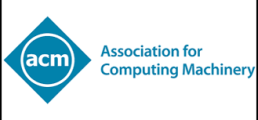The Association for Computing Machinery (ACM)
The Association for Computing Machinery (ACM) was founded in 1947 in response to the rapid advancements in computing technology following World War II. Established by a group of forward-thinking computer scientists and industry leaders, ACM was created to provide a platform for collaboration, knowledge sharing, and innovation within the computing profession. The organization's founders envisioned a professional society that would advance computing as both a science and a practice, addressing its growing significance in scientific research, industry, and society.
Early Years and Foundational Achievements
The early years of ACM were marked by its efforts to build a cohesive community of computing professionals. One of its seminal achievements was the launch of Communications of the ACM (CACM), the organization’s flagship publication. CACM quickly became a leading journal in the field, providing a vital forum for disseminating groundbreaking research and fostering discourse among computing experts. This publication has been instrumental in shaping the field of computing, offering insights into emerging trends and developments.
In the years following its founding, ACM expanded its scope by establishing Special Interest Groups (SIGs). These SIGs were designed to focus on specific areas of computing, such as programming languages, artificial intelligence, and human-computer interaction. This specialization allowed ACM to cater to diverse interests within the computing community, supporting both generalists and specialists. Through these SIGs, ACM facilitated detailed discussions and advancements in various subfields, contributing to the overall growth of computing as a discipline.
The ACM Digital Library: A Major Innovation
A significant milestone for ACM was the creation of the ACM Digital Library, launched in 1997. This extensive digital repository has become a cornerstone for computing research, offering access to a vast collection of academic literature, including research articles, conference proceedings, and technical papers. The ACM Digital Library has played a crucial role in democratizing access to high-quality research, making it available to computing professionals, researchers, and students worldwide.
The Digital Library’s impact extends beyond just providing access to information; it has also fostered collaboration among researchers and industry professionals. By centralizing a wealth of knowledge, the ACM Digital Library supports innovation and accelerates advancements in technology. It continues to serve as an essential resource for anyone engaged in the study or practice of computing.
ACM Conferences and Events: A Platform for Collaboration
ACM is renowned for organizing a wide range of conferences and events that bring together computing professionals from across the globe. These gatherings include major conferences such as SIGGRAPH, CHI, and ICSE, which are considered among the most prestigious in their respective areas. ACM conferences provide a platform for presenting cutting-edge research, networking with peers, and exploring emerging trends in computing.
For instance, SIGGRAPH is ACM’s premier conference on computer graphics and interactive techniques. It has established itself as a key event for professionals in animation, visual effects, and interactive technologies. Similarly, CHI, the Conference on Human Factors in Computing Systems, is one of the leading forums for research on human-computer interaction, drawing top experts from around the world.
In addition to these major events, ACM organizes numerous smaller workshops, symposiums, and regional conferences each year. These events offer valuable opportunities for networking, learning, and professional development, ensuring that computing professionals at all stages of their careers have access to relevant and current knowledge.
Educational Initiatives and Professional Development
ACM’s commitment to advancing education in computing is evident in its extensive range of educational programs and resources. The organization provides curricula, tutorials, and certification programs designed to equip students, educators, and professionals with the skills needed to succeed in the rapidly evolving field of computing.
One of ACM’s key educational resources is the ACM Learning Center, which offers online courses, webinars, and tutorials on a variety of computing topics. The Learning Center is designed to help professionals stay up-to-date with industry trends and acquire new skills through hands-on learning experiences. This resource is invaluable for those seeking to enhance their expertise and remain competitive in the field.
Furthermore, ACM has significantly influenced computing education standards through its collaboration with academic institutions, government agencies, and industry partners. The organization’s Computer Science Curriculum Guidelines have been adopted by universities and colleges worldwide, providing a framework for high-quality computer science education. These guidelines ensure that students receive a rigorous and relevant education, preparing them for careers in computing.
Ethics and Social Responsibility
ACM has a long-standing commitment to ethics and social responsibility in computing. The organization’s Code of Ethics and Professional Conduct outlines principles that guide computing professionals in their work, emphasizing the importance of honesty, fairness, and respect for others. ACM encourages its members to consider the broader societal implications of their work and to use computing technology in ways that benefit humanity.
In recent years, ACM has been actively addressing ethical challenges related to emerging technologies such as artificial intelligence and data privacy. The organization has convened expert panels, published guidelines, and advocated for policies that promote ethical and responsible technology use. By prioritizing ethics and social responsibility, ACM continues to shape the future of computing in ways that positively impact individuals and society.
Why Learners Should Consider ACM
ACM’s reputation for excellence, extensive professional network, and dedication to advancing computing knowledge make it a premier institution for learners and professionals in the field. For those interested in cutting-edge research, networking opportunities, and skill enhancement, ACM offers unparalleled resources and programs.
Through its digital library, conferences, and professional development initiatives, ACM provides a comprehensive platform for engagement with the latest innovations in computing. Whether you are a student, researcher, or seasoned professional, ACM offers valuable tools and opportunities to help you stay at the forefront of technological advancements.
ACM’s influence extends beyond its own initiatives, contributing to the broader computing landscape through its ethical standards, educational programs, and commitment to social responsibility. As the computing field continues to evolve, ACM remains a vital resource for fostering innovation, collaboration, and professional growth.

